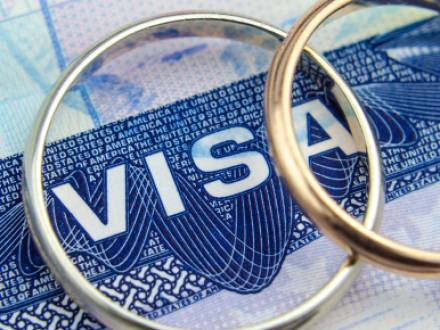Can a Deported Person Return by Marrying a U.S. Citizen?
 Suppose a couple has been living with one another for months, or even years, with the intention of marrying at some point in the future. The woman has an employment authorization document that requires renewals. The couple may even have children, and both have steady jobs. The woman is picked up by ICE at her workplace one day and is not even allowed to call her partner. She soon finds herself dropped off in Mexico, where she no longer has family or friends. With no money and no job, she is frantic to speak to her partner and return to the U.S. so they can marry.
Suppose a couple has been living with one another for months, or even years, with the intention of marrying at some point in the future. The woman has an employment authorization document that requires renewals. The couple may even have children, and both have steady jobs. The woman is picked up by ICE at her workplace one day and is not even allowed to call her partner. She soon finds herself dropped off in Mexico, where she no longer has family or friends. With no money and no job, she is frantic to speak to her partner and return to the U.S. so they can marry.
Depending on the specific type of immigration status, deported individuals may be able to re-enter the country by marrying a U.S. citizen through a waiver of inadmissibility. This waiver sometimes allows those who have been deported to return to the U.S. early, receiving either a green card or an immigrant visa. To be sure, it is not an easy path for a deportee to re-enter the United States because once removed, he or she is considered "inadmissible." This requires spending a certain amount of time outside the U.S. before returning – a process that can take years.
If the deportation was for specific reasons – such as unlawful presence in the U.S. or a felony conviction – then re-entry cannot be achieved via a Form I-212. Depending on the grounds for removal, a USCIS Form I-601(an Application for Waiver of Grounds of Inadmissibility) would need to be filed. If the individual marries a U.S. citizen, the government considers them an immediate relative, so they could potentially apply for re-entry through this waiver of inadmissibility. This is a complex issue that requires the experience of a knowledgeable immigration attorney in Herndon, VA.
Petitioning for an Alien Fiancé to Obtain a K-1 Nonimmigrant Visa
Normally, the woman in the example above would apply for a K-1 nonimmigrant visa to travel to the United States and be admitted into the country. Within 90 days of that admission into the U.S., the woman would enter into a marriage with the U.S. citizen who filed Form I-129F, Petition for Alien Fiancé. At that point, the woman could apply for lawful permanent resident status (a Green Card). However, since the woman was deported, she must now apply for a waiver of inadmissibility because her deportation made her inadmissible.
Why Are People Deported?
One deportable offense is criminal activity, including charges or convictions for drug trafficking, murder, rape, kidnapping, racketeering, child pornography, treason, sabotage, fraud, tax evasion, money laundering, robbery, theft, spousal or child abuse, mayhem, and animal fighting. Crimes involving possession of controlled substances may also make an individual inadmissible.
Failure to meet conditions of a conditional permanent resident, firearms crimes, smuggling, or inadmissibility at the border are all potential reasons for deportation. Generally speaking, a person removed based on his or her deportation status or who left the country following an order of removal is inadmissible for ten years.
Waivers of Inadmissibility or Application for Permission to Reapply for Admission
If the person was not removed because of a criminal offense, he or she might be able to complete a Form I-212 – Permission to Reapply for Admission – and gain re-entry into the United States. This route will require extensive paperwork and documentation, including a record of the applicant's lawful presence in the country, his or her immigration status during that period, court documents from the removal proceedings, and evidence of good moral character.
If the deportation involved unlawful presence or felony convictions, a waiver of grounds of inadmissibility must be applied for in an effort to remove the grounds for removal. If the U.S. citizen spouse travels to where the other spouse was deported and they marry, she will be considered an immediate relative and may re-enter the U.S. through a waiver of inadmissibility.
Contact a Fairfax County, VA Immigration Attorney
Those who have been deported must speak to a knowledgeable national immigration attorney from Immigration Legal Advisors, PLLC as quickly as possible. Attorney Ruiz has more than 20 years of experience, is very supportive, and speaks both English and Spanish. Call 571-441-2233 to schedule an initial meeting with the attorney.





